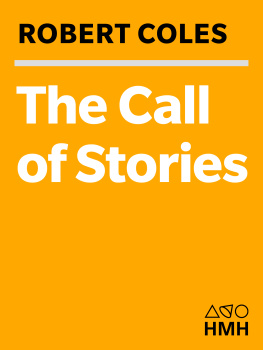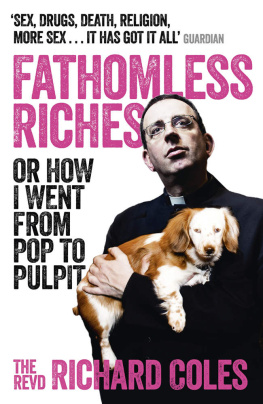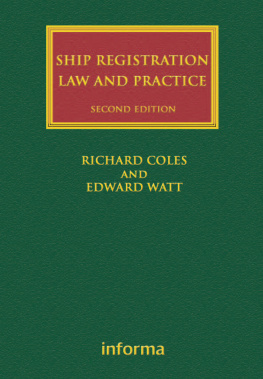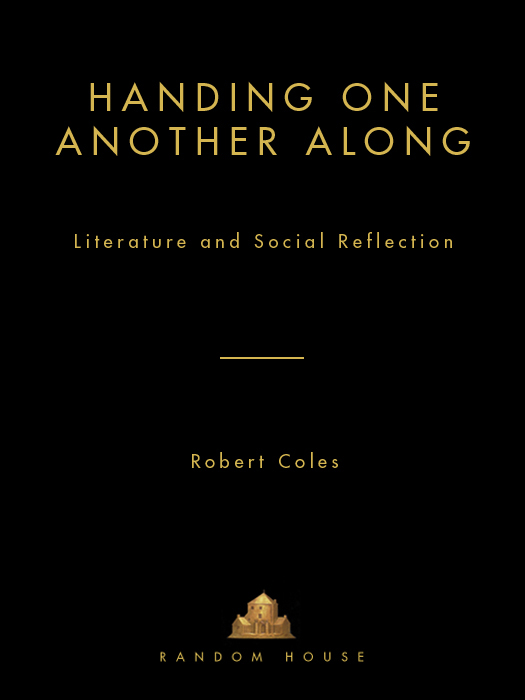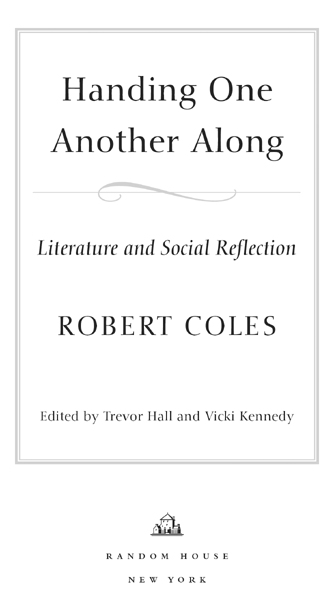ALSO BY ROBERT COLES
Teaching Stories: An Anthology on the Power of Learning and Literature
Bruce Springsteens America
Lives of Moral Leadership
The Moral Intelligence of Children
Children of Crisis I: A Study of Courage and Fear
Still Hungry in America
The Image Is You
Uprooted Children
Teachers and the Children of Poverty
Wages of Neglect (with Maria Piers)
Drugs and Youth (with Joseph Brenner and Dermont Meagher)
Erik H. Erikson: The Growth of His Work
The Middle Americans (with Jon Erikson)
The Geography of Faith (with Daniel Berrigan)
Migrants, Sharecroppers, Mountaineers (volume II of Children of Crisis)
The South Goes North (volume III of Children of Crisis)
Farewell to the South
Twelve to Sixteen: Early Adolescence (with Jerome Kagan)
A Spectacle unto the World: The Catholic Worker Movement (with Jon Erikson)
The Old Ones of New Mexico (with Alex Harris)
The Buses Roll (with Carol Baldwin)
The Darkness and the Light (with Doris Ulmann)
Irony in the Minds Life: Essays on Novels by James Agee, Elizabeth Bowen, and George Eliot
William Carlos Williams: The Knack of Survival in America
The Minds Fate: Ways of Seeing Psychiatry and Psychoanalysis
Eskimos, Chicanos, Indians (volume IV of Children of Crisis)
Privileged Ones: The Well-off and the Rich in America (volume V of Children of Crisis)
A Festering Sweetness (poems)
The Last and First Eskimos (with Alex Harris)
Women of Crisis I: Lives of Struggle and Hope (with Jane Coles)
Walker Percy: An American Search
Flannery OConnors South Women of Crisis II: Lives of Work and Dreams (with Jane Coles)
Dorothea Lange
The Doctor Stories of William Carlos Williams (editor)
Agee (with Ross Spears)
The Moral Life of Children
The Political Life of Children
Simone Weil: A Modern Pilgrimage
Dorothy Day: A Radical Devotion
In the Streets (with Helen Levitt)
Times of Surrender: Selected Essays
Harvard Diary: Reflections on the Sacred and the Secular
That Red Wheelbarrow: Selected Literary Essays
The Child in Our Times: Studies in the Development of Resiliency (edited with Timothy Dugan)
Anna Freud: The Dream of Psychoanalysis
Rumors of Separate Worlds (poems)
The Spiritual Life of Children
The Call of Stories: Teaching and the Moral Imagination
Their Eyes Meeting the World: The Drawings and Paintings of Children (with Margaret Sartor)
The Call of Service: A Witness to Idealism
Doing Documentary Work
The Secular Mind
When They Were Young
FOR CHILDREN
Dead End School
The Grass Pipe
Saving Face
Riding Free
Headsparks
To our many Literature of Social Reflection
(Gen. Ed. 105) students, teachers
with much gratitude, appreciation, thankfulness
for all the stories shared
CONTENTS
PART I.
The literary and journalistic documentary tradition of social observationthe call to venture outside of what we know and attend the stories of others.
Featured: James Agee, George Orwell, and William Carlos Williams
ONE:
TWO:
THREE:
FOUR:
PART II.
Meeting so-called ordinary American working-class men and women: courage, challenge, kindness, and complexity in everyday living.
Featured: The Old Ones of New Mexico, Raymond Carver, Edward Hopper, Tillie Olsen, and Ruby Bridges
SIX:
SEVEN:
EIGHT:
NINE:
TEN:
ELEVEN:
PART III.
Ways of seeing race and identityencounters through the eyes of another.
Featured: Ralph Ellison, Flannery OConnor
TWELVE:
THIRTEEN:
FOURTEEN:
PART IV.
Intellectuals and the religious searchfinding meaning in the life given to us.
Featured: Dorothy Day, Ignazio Silone, Elie Wiesel, John Cheever, Walker Percy, Zora Neale Hurston, and a Potato Chip Truck
FIFTEEN:
SIXTEEN:
SEVENTEEN:
EIGHTEEN:
PART V.
Finding simple clarity amidst moral, psychological, and social complexity.
Featured: Paul Gauguin, Charles Dickens, Thomas Hardy, and George Eliot
TWENTY:
INTRODUCTION
Handing One Another Along
I f I could have a sound track running for you as you read this book, you would be listening to Billie Holiday. In fact, when I taught the Harvard University course upon which this book is based, a course aimed at reflecting on life and moral courage, and how we might develop character and moral courage in our own lives, I began each class with one of her songs. Right now you might be hearing Black and Blue or Body and Soul or Them There Eyes. She was another narrator of sorts, for us, as we talk about life, literature, and art, about how we reflect upon and understand the stories around us. Billie would be singing her bloody heart out, her voice soothing, searching, telling, confessing, bringing to life all the pain and love and loss that a gifted singer can render, causing us to become more aware of our own yearnings, and the yearnings of others. Billie would join the other people, the writers, poets, photographers, and artists whose works help inspire us and are examined in the pages ahead, individuals who help us think about personal character, people who have struggled hard to reconcile scholarly, literary, artistic interests and pursuits with moral concerns, with the enduring questions of where do we come from, what are we, and where are we going. These and other questions are directly and artistically renderedfor example, by Paul Gauguin in his painting Do venons-nous? Que sommes-nous? O Allons-nous?, a work we will visit toward the end of this book. With written and visual stories as our guides, we embark on a journey, exploring the world through social reflection and observation of a particular kind. The idea is to venture outside of our own immediate experiences, to wonder about and wander with others in search of an understanding that will enable us to hand one another along.
With Billie Holiday providing the ambient accompaniment, we join James Agee in Alabama and George Orwell in the Midlands of England. We meet Dr. William Carlos Williams, a physician from Rutherford, New Jersey, who every day made house calls to his patients, carrying his black bag up tenement stairs. In the evening, stethoscope put aside and typewriter picked up, Williams composed poems and stories and worked on novels, trying to give us a sense of what it meant to be with particular Americans, as he knew them in the 1920s, 30s, and 40s.
While Billie sings of longing, we meet the writer Raymond Carver, whose family moved from Arkansas to the West Coast, working in factories and in the fields. We meet the people who populate his poems and short stories: blue-collar workers, waitresses, motel workers, people who are washed out, or who are drying out. Yet for all their pain, their marginality and vulnerability, the redemptive epiphanies in Carvers stories are not unlike the epiphanies all of us have, or hope to have, as we come to terms with the deep beauty and deep disruptions of life.





